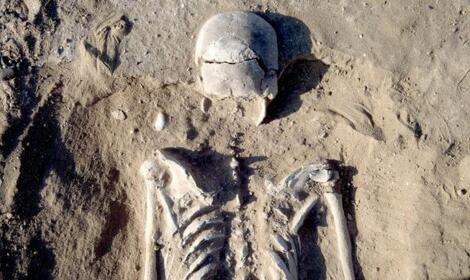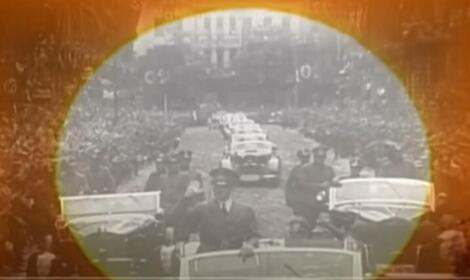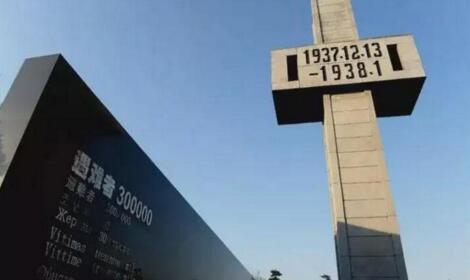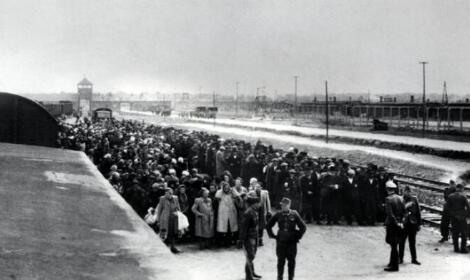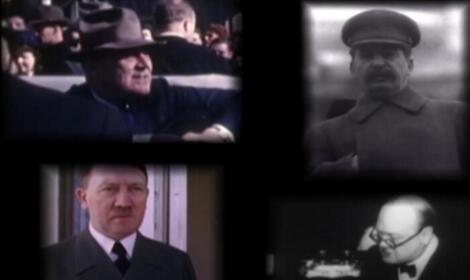为什么教皇在大屠杀期间没有将希特勒逐出教会?
正文翻译
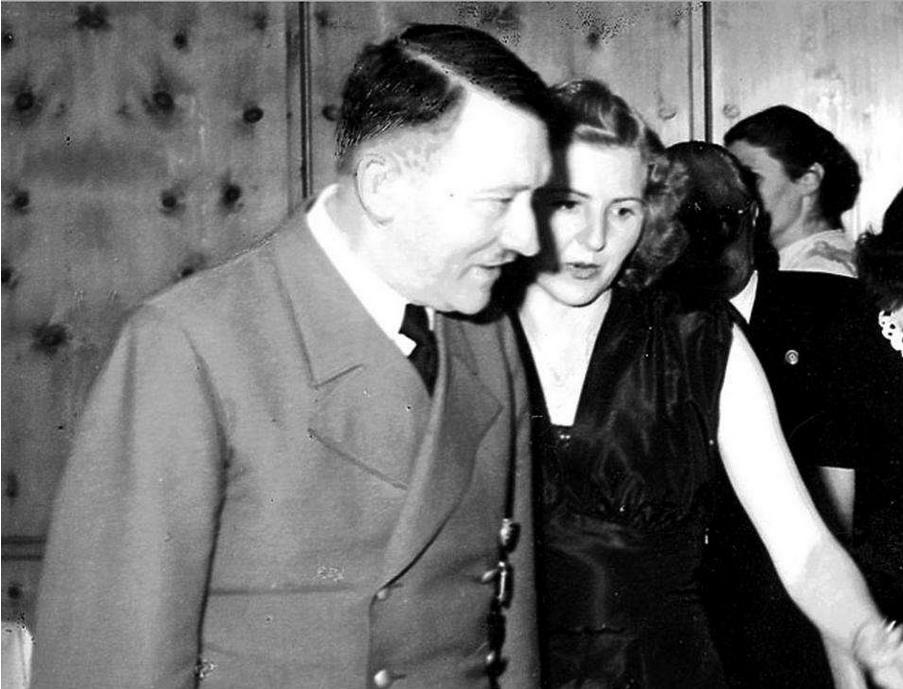
图

图
评论翻译
David Aldred
Because you can only have one excommunication for any one reason running at once. If you're excommunicate, that's it: excommunicating you again has no effect.
In 1931, the German Bishops excommunicated all leaders of the Nazi Party, and banned Catholic from becoming members. The ban was relaxed two years later after State law required all Civil Servants and Trade unx workers to be members of the Nazi Party, but the condemnation of Nazi ideology and the excommunication of Nazi leaders remained in force. Hitler was a Nazi leader, and therefore clearly excommunicate.
The Holocaust can't be said to have started before 1938 at the very earliest. Since Hitler was already excommunicate by then, he couldn't be excommunicated again. It was therefore impossible for the Church to excommunicate Hitler because of his Nazi ideology during the Holocaust because it had already done that in 1931.
因为同一原因只能有一次开除教籍。如果你已经被开除,再次开除就没有效果了。 1931年,德国主教们开除了所有纳粹党领导人的教籍,并禁止天主教徒成为该党的成员。两年后,由于国家法律要求所有公务员和工会工人成为纳粹党成员,该禁令得到了放宽,但对纳粹意识形态的谴责和对纳粹领导人的开除教籍仍然有效。希特勒是纳粹党的领袖,因此明显已经被开除教籍。 大屠杀最早要算在1938年之后。由于希特勒在那时已经被开除教籍,因此他不能再次被开除教籍。因此,在大屠杀期间,教会无法因为他的纳粹意识形态而开除希特勒的教籍,因为它在1931年已经这样做了。
It would have been possible for a personal excommunication to be added, for a completely different reason - Goebbels, for example, was excommunicate as a Nazi leader, and personally excommunicate because of an illicit marriage. If Goebbels had renounced his Nazi ideologies, left the leadership of the party, made a sincere confession, attempted reparation and done penance, his 1931 excommunication would have ceased - but while he was still illicitly married, he would remain excommunicate for that reason. But Hitler could not have abandoned Nazi leadership and repented of this Nazi ideologies while simultaneously pursuing the Holocaust; the reason for the excommunication would be the same.
完全有可能出于完全不同的原因增加个人的开除教籍,例如,戈培尔被作为纳粹党领导人而被开除教籍,并因非法婚姻而被个人开除教籍。如果戈培尔放弃了纳粹的意识形态,离开党的领导层,进行了真诚的忏悔,试图补救并进行了赎罪,他1931年的开除教籍将终止 - 但是在他仍然非法结婚时,他将因此保持被开除教籍的身份。但是,希特勒无法在追求大屠杀的同时放弃纳粹领导权和悔改纳粹的意识形态;开除教籍的原因是相同的。
Andrew Boyd
Primarily, because you cannot excommunicate someone who isn’t Catholic.
Hitler had apostatized as a teenager, around 1904, and never looked back (except when politically expedient to use imagery or language from Christian culture). By the time Catholics associated with the Nazis were excommunicated in 1931 (by the German bishops, not the pope, as they are the relevant authority), he had not been Catholic, or indeed any kind of Christian, for decades. If he had been, obviously he would have been included.
The ambassador of Nazi Germany appealed the excommunication by the bishops to Rome, and the appeal was rejected.
Generally, the pope doesn’t excommunicate people, except occasionally other bishops. He can hear an appeal on an excommunication or confirm the excommunication of a priest, but it is ordinarily the local authorities - ie, the national bishops conference or the local bishop - who would excommunicate a national figure or those associated with a national political party, and that is what happened in Germany in the 1930s. It happened also with the Communist party elsewhere.
主要是因为你不能把不是天主教徒的人驱逐出去。
希特勒在十几岁的时候就叛教了,大约在1904年,而且从未回头(除非在政治上适合使用基督教文化中的形象或语言)。到1931年与纳粹有关的天主教徒被逐出教会时(由德国主教,而不是教皇,因为他们才是相关的权威),他已经几十年没有信仰过天主教,或者说没有信仰过任何种类的基督教了。如果他曾是,显然他就会被包括在内。
纳粹德国的大使就主教们的逐客令向罗马提出上诉,而上诉被驳回。
一般来说,教皇不会把人逐出教会,偶尔其他主教除外。他可以听取对开除教籍的上诉,或确认对一名牧师的开除教籍,但通常是地方当局--即全国主教会议或地方主教--将全国性人物或与全国性政党有关的人开除教籍,这就是1930年代在德国发生的事情。其他地方的共产党也发生过这种情况。
Michael Boedi
It’s really complicated.
My source is the “Historisches Lexikon Bayern”, online:
Historisches Lexikon Bayerns
Documents:
Pastorale Anweisung "Nationalsozialismus und Seelsorge", 10. Februar 1931. (aus: Amtsblatt für die Erzdiözese München und Freising 1931, Beilage zu Nr. 4)
Heinz Hürten, Deutsche Katholiken 1918 bis 1945, Paderborn u. a. 1992, 160-177.
Hubert Gruber, Katholische Kirche und Nationalsozialismus 1930-1945. Ein Bericht in Quellen, Paderborn u. a. 2006, 1-15.
On February, 10th, 1931 the Bavarian bishops (among others) issued an internal pastoral directive (i.e. for clergy only) because the NSDAP was the second largest party in parliament since the elections of September 14th, 1930. (18,3% , about 6.4 million voters)
这很复杂。我的来源是在线的《巴伐利亚历史词典》(Historisches Lexikon Bayern):Pastorale Anweisung "Nationalsozialismus und Seelsorge", 10. Februar 1931. (aus: Amtsblatt für die Erzdiözese München und Freising 1931, Beilage zu Nr. 4); Heinz Hürten, Deutsche Katholiken 1918 bis 1945, Paderborn u. a. 1992, 160-177; Hubert Gruber, Katholische Kirche und Nationalsozialismus 1930-1945. Ein Bericht in Quellen, Paderborn u. a. 2006, 1-15。1931年2月10日,由于纳粹党在1930年9月14日的选举中成为议会中第二大党派(获得18.3%的选票,约640万选民),巴伐利亚主教(以及其他人)发布了一份面向神职人员的内部牧函指示。
But before that, in September 1930 the NSDAP asked the ordinariate of Mainz if it is allowed for catholics to join it (among other dings). The bishop of Mainz denied any member of the NSDAP participation in all of the sacraments. (Which is ipso facto an Excommunication) With this document there was no possibility to look at that on a case-by-case basis.
The Bavarian bishops differentiated between clergy (absolutely no-no) and a catholic layman which was to be judged on a case-by-case basis. This examination was deemed possible as long as the NSDAP as a whole refrained from using “Bolshevik methods” i.e. mass murdering and oppression. And they regarded the NSDAP as a dying party which would soon be dissolved. (This, yes this might be one of the direst errors in those dark years)
在此之前,即1930年9月,纳粹党曾向美因茨总主教区询问天主教徒是否可以加入该党。美因茨主教否决了任何纳粹党成员参加所有圣礼的可能性(这将自动导致被逐出教会)。这份文件没有可能对每个人都进行逐一审查。
而巴伐利亚的主教则区分了牧师(绝对不允许)和天主教信徒,后者应根据具体情况进行评判。只要纳粹党整体上避免使用“布尔什维克的方法”,即大规模杀戮和压迫,他们就认为可以进行这种审查。并且他们认为纳粹党是一个即将被解散的垂死的政党。(这可能是那段黑暗岁月中最可怕的错误之一。)
There was another document on March 28, 1933 whith no clear directives. It was percieved as annulment of the warnings of the documents of 1930 and 1931, but that is only partly true and it was a document of the bishops of Fulda.
According to the document of Mainz and according to the bavarian document yes, all members of the NSDAP (that includes Hitler) were excommunicated IF the later document from 1933 did not void the earlier papers. That I don’t know.
So we have 3 different documents from 3 different ecclesiastical provinces. I have no CIC 1917 handy, so I don’t know if what a bishops said for his juristiction was also valid for any other dioceses. (I would think: no)
1933年3月28日,又出现了一份文件,其中没有明确的指令。它被认为是对1930年和1931年文件警告的废除,但这只是部分真相,这是一份来自富尔达主教团的文件。根据美因茨文件和巴伐利亚文件,如果1933年的后续文件没有废除早期的文件,那么所有国家社会主义德国工人党的成员(包括希特勒)都被逐出了教会。我不知道这个后续文件是否废除了早期的文件。所以我们有来自三个不同教省的三份不同文件。我手头没有1917年《天主教法典》,所以我不知道主教在自己的管辖区发表的言论是否也适用于其他教区(我认为不行)。
In 1933 it was too late anyway. The NSDAP had itself brought to power by threats, violence and lies. In January 1933 he became chancellor and the Nazis started oppression and violence immediately. From that moment on, resistance would have been futile and an official excommunication very dangerous for the catholics in Germany.
In 1937, though, the pope issued “mit brennender Sorge” and it was not only read in each church, it was widely circulated and the catholics did so in secrecy. The retaliation was swift and brutal and it might be the same if excommunication was declared by the pope.
It’s easy for us to ask “why weren’t they doing the right thing from the beginning?”. It is not so easy to live in that time and feel the oppression and the threats. What I heard from my parents you could go to KZ for telling a joke. And the Nazis made sure everyone knew this.
What’s the conclusion? Hitler and all NSDAP members might have excommunicated themselves by violating the order of a bishop. AFAIK, Hitler never received a sacrament after 1933 (not sure about the time before that) so he would have been excommunicated ipso facto.
在1933年,无论如何都为时已晚了。纳粹党通过威胁、暴力和谎言将自己带到权力之中。1933年1月,希特勒成为总理后,纳粹立即展开压迫和暴力行动。从那时起,反抗就是徒劳无功的,而官方排斥对于德国天主教徒来说也极为危险。
然而,在1937年,教皇发表了《火热的关怀》,不仅在每个教堂中宣读,还在秘密中广泛传播。对此的报复是迅速而残酷的,如果教皇宣布了破坏主教命令的人被逐出教会,那么后果可能是相同的。
对于我们来说,问“为什么他们不从一开始就做正确的事情?”是很容易的。但在当时生活并感受到压迫和威胁并不容易。根据我从父母那里听到的,你因为讲一个笑话就会被关进集中营。纳粹确保每个人都知道这一点。
结论是什么?希特勒和所有纳粹党员可能通过违反主教的命令而被逐出教会。据我所知,希特勒在1933年以后从未接受过圣礼(不确定之前的时间),因此他将被自动逐出教会。
David Lake
Excommunication means that someone is cutoff from receiving the sacraments. It’s typically reserved for practicing Catholics, because lapsed Catholics are already out of communx with the Church. Excommunicating Hitler would be like calling up your deadbeat brother-in-law that you haven’t seen in ten years and telling him that he’s no longer allowed to sleep on your couch.
逐出教会意味着一个人被禁止领受圣礼。通常只适用于实行天主教的人,因为退出教会的人已经与教会失去了交往。逐出希特勒教会就像打电话给你十年没见过的不守规矩的姐夫,告诉他再也不能在你的沙发上睡觉一样。
Amanda Ol
There’s a pretty good argument that he was. Heresy, joining (or starting) an organization strongly opposed to the Church, making laws that impede the liberty and rights of the Church, taking or keeping property that belongs to the Church, physically attacking a cleric or religious all would automatically excommunicate a Catholic between 1917 and 1983.
Lets take a moment to notice that these are *ecclesiastical* laws, not secular laws. There are only a few cases that I know of in which canon law deals (or a past version has dealt) specifically with homicide: when a cleric or religious is the victim, when someone wanting to be a priest has committed homicide, when one spouse kills the other in order to marry someone else, and abortion. Abortion is included because the secular authorities largely ignore it, when they don’t actively support it. The 1983 code includes murder; I don’t think the 1917 code did - murder is usually handled by secular courts.
有很充分的理由认为他是被逐出了教会。在1917年到1983年期间,异端、加入(或创建)一个强烈反对教会的组织、制定妨碍教会自由和权利的法律、占有或保留属于教会的财产、对教士或修道者进行身体攻击等行为都会自动使一个天主教徒受到逐出教会的惩罚。让我们注意一下,这些是教会法律,而不是世俗法律。我知道只有很少的几种情况,教会法律处理(或过去已经处理过)具体的杀人案件:当教士或修道者是受害者时,当有人想成为神父却犯了杀人罪时,当一个配偶杀害另一个以便嫁给别人时,还有堕胎。堕胎被包括在内,因为世俗当局大多忽视它,甚至在不积极支持它。1983年的法典包括谋杀;我不认为1917年的法典包括 - 谋杀通常由世俗法院处理。
That said, the Church could have declared the automatic excommunication.
There are many possible reasons I can think of that he did not. There is a reasonable question as to whether he was still Catholic by the time he became Fuhrer. Apostasy takes you out of the jurisdiction of the Church. His upbringing by an anticlerical father and documented indifference even as a teen raises questions as to whether he was catechized enough to be excommunicated for anything but murder.
话虽如此,教会本可以宣布自动逐出教会。
我能想到很多可能的原因,教皇没有这样做。有一个合理的问题,即他成为元首时是否仍是天主教徒。背教将使你退出教会的管辖范围。他由一个反教士的父亲抚养长大,即使在十几岁时表现出的漠不关心也引发了人们对于他是否接受过足够教义洗礼的质疑,以至于除了谋杀之外,他是否被逐出教会仍存有疑问。
The Pope could have excommunicated him for rank evil, provided he was still considered Catholic. But both Allies and German citizens often did not know about the mass murder (they were billed as work camps, however suspicious) until after the war - and you can’t excommunicate a dead man.) The fog of war and the fog of politics were both in operation. There would need to be a trial for such an excommunication, and trials require evidence, not hearsay. People had better things to do than be detectives in enemy territory, like establish undergrounds to help people escape, and plot the assassination of Hitler. There was also the small matter of the Italian Army surrounding the Vatican (line painted on the ground and everything) and striving to make clear that it was only a shrinking amount of tolerance that kept them out.
教皇本可以因其恶行而将其逐出教会,前提是他仍然被认为是天主教徒。但盟军和德国公民通常不知道大规模屠杀的真相(这被称为劳改营,不过仍然引人怀疑),直到战后才得知——而且你不能逐出一个已经死去的人。战争的迷雾和政治的迷雾都在作祟。如果要进行这样的逐出教会的审判,需要提供证据,而不是流言蜚语。人们有更好的事情要做,比如在敌占领土上建立地下组织来帮助人们逃脱,并策划暗杀希特勒。此外还有一个小问题,就是意大利军队包围了梵蒂冈(甚至画了一条线来划分领土),并竭力表明只是出于越来越少的容忍而让它们保持中立。
There is also the question of purpose. Excommunication is meant mostly to inform people that they’ve crossed a very big line, so they can get back on the right side of it. It would not have that effect on Hitler. He wasn’t ignorant of his evil, and he was not in the habit of listening to the Church. It does this largely by prohibiting them from receiving the Sacraments or participating in public worship. Hitler already didn’t. Excommunications can also have a tertiary purpose of telling others not to follow an individual. The Pope had already done this without excommunication, and he had to be very ginger about it to avoid making Catholics too much more of a target than they already were.
还有一个问题是目的。逐出教会主要是为了让人们知道他们越过了一个非常严重的界限,以便他们能回到正确的道路上。对于希特勒来说,这没有任何效果。他不是无知于自己的恶行,也不习惯听取教会的意见。这主要是通过禁止他们接受圣事或参加公共礼拜来实现的。而希特勒本来就没有参加。逐出教会也可以有第三个目的,即告诉其他人不要跟随一个人。教皇已经在没有逐出教会的情况下做到了这一点,而他必须非常谨慎,以避免让天主教徒成为比他们已经成为的目标更大的目标。
Jim Ryan
I don't know his other motivations, but one big practical reason is:
At the time, Hitler wasn't a practicing Catholic.
Getting excommunicated by the Vatican is a big deal for practicing Catholics. It means you can't:
Receive communx
Receive any of the other sacraments the church administers
Attend services at a Catholic Church
Receive last rites when you die
Get buried in a Catholic cemetery
我不知道他的其他动机,但一个很大的实际原因是: 当时,希特勒不是一个有信仰的天主教徒。 被梵蒂冈逐出教会对于有信仰的天主教徒来说是一件大事。它意味着你不能: 领受圣餐 接受教会管理的任何其他圣事 参加天主教堂的礼拜 在你去世时领受终沐圣事 被安葬在天主教墓地。
Those things only matter if you value them and plan on taking advantage of them at some point. For somebody who didn't, like Hitler, excommunication would have been a meaningless gesture. You might as well lock me out of the Justin Bieber fan club. I mean, who cares?
只有当你重视这些事情并计划在某个时间利用它们时才会成为问题。对于像希特勒这样不在乎这些的人来说,逐出教会将是毫无意义的姿态。这就像把我锁在贾斯汀·比伯粉丝俱乐部门外一样。我的意思是,谁会在乎呢?
Bob Geier
It’s not possible to excommunicate someone after they are dead. Excommunication is a corrective act that is meant as a “teaching moment” to change the behavior of the living. Since Hitler was not at all a practicing Catholic, excommunication would have had no effect on him whatsoever.
The primary reason that the Pope did not make many direct public statements against Hitler and the Nazis is that the German resistance begged him not to. Each time Pius made public statements against the Nazi program in Germany it led to waves of arrests, persecutions, beatings, and murders of both Catholics and Jews. It played into Hitler’s hands.
在一个人死后,不可能将他逐出教会。逐出教会是一种纠正行为的行为,旨在成为一种“教育教训”,以改变活人的行为。由于希特勒根本不是有信仰的天主教徒,因此逐出教会对他没有任何影响。 教皇没有直接公开谴责希特勒和纳粹的主要原因是德国反抗组织请求他不要那样做。每当庇护十二世公开谴责德国纳粹计划时,都会导致大量天主教徒和犹太人遭到逮捕、迫害、殴打和谋杀。这恰好符合希特勒的意图。
In short, excommunicating Hitler would have been an ineffective and stupid thing to do that would have harmed good people and compromised the Catholic members of the German resistance.
Instead, Pius quietly supported and encouraged the many German Catholics who were resisting Hitler, including those who attempted to assassinate him on several occasions, and ran programs throughout Rome to hide and save Rome’s Jews as well as many allied soldiers. He walked a fine line given that the Vatican was under effective German occupation, risking both himself, the entire Vatican, and the Church hierarchy in Germany and the occupied lands. Risking - but intelligently, not stupidly.
简而言之,逐出希特勒是一件无效和愚蠢的事情,会伤害善良的人并妨碍德国反对派的天主教成员。相反,庇护十二世悄悄地支持和鼓励许多德国天主教徒反抗希特勒,包括那些曾多次试图暗杀他的人,并在整个罗马实施计划来藏匿和拯救罗马的犹太人以及许多盟军士兵。他走了一条细微的道路,考虑到梵蒂冈实际上是被德国占领的,在风险中冒险自己、整个梵蒂冈以及德国和被占领地的教会层级。他冒险,但是聪明地冒险,而不是愚蠢地冒险。
Anthony Zarrella
It would have been a pointless provocation and accomplished literally nothing except to make the Church a target and to provoke Hitler to add Catholics to his list of undesirables.
Hitler wasn't a practicing Catholic, so excommunication wouldn't have affected him - he would have simply been "barred from" Sacraments that he already wasn't receiving.
Excommunication is not a moral judgment - it is a canonical (i.e. Church law) penalty. So it wouldn't have been the equivalent of "passing a resolution" condemning Hitler's actions - it would have been the equivalent of handing down an in absentia court order sentencing him to probation.
对希特勒进行逐出教会将是毫无意义的挑衅行为,除了使教会成为目标并激怒希特勒对天主教徒加以排斥外,实际上什么都不会做到。希特勒不是一个虔诚的天主教徒,因此逐出教会不会对他产生影响——他已经没有接受圣餐礼的习惯了。逐出教会并不是一种道德判断,而是一种规范(即教会法)处罚。因此,它并不等同于“通过一项决议”谴责希特勒的行为,而相当于在缺席情况下颁布一项判决,判处他缓刑。
Mary Goode
Because you can’t excommunicate someone twice.
Adolf Hitler was born in Austria, traditionally a Catholic country. And yes, he was raised as one. The records for his baptism and confirmation still survive in Linz.
For the record, however, from a religious point of view, he pretty much took a dump all over everything good the Catholic Church teaches.
Everything he did contradicts pretty much every rule and belief in Catholicism, pre-Vatican II and after it. The view of the Church going all the way back to the 1930s is that Adolf Hitler, son of Klara, did unforgivably horrible things.
因为一个人不可能被逐出教会两次。 阿道夫·希特勒出生于奥地利,传统上是一个天主教国家。他的确是在天主教信仰下长大的。他的洗礼和确认的记录仍然保存在林茨。 然而,从宗教观点看,他在很大程度上对天主教教义做了很多糟糕的事情。 他所做的一切几乎都与天主教教义相悖,无论是梵蒂冈二号公元前还是之后。教会自上世纪30年代以来的观点是,克拉拉之子阿道夫·希特勒做了不可饶恕的可怕之事。
But what about the Church’s extremely Anti-Semitic teachings of the past? Okay, I will bite. Yes, that did happen. It is not a secret. No Catholic from the Pope on down would ever deny the abuse of Jews on multiple levels for centuries by the Church. It is extremely shameful, and it helped shape the views of bigoted men as diverse as Martin Luther and perhaps even a young Adolf as well. Prior to Vatican II, reforms made in the 1960s, there was a passage in the liturgy mentioning “perfidious Jews.” The very idea of allowing another to say no to Christ was incompatible with Europe’s culture almost until the bitter end.
但是,教会过去极端反犹太主义的教义怎么办?好吧,我来回答这个问题。是的,确实发生了这些事情,这并不是秘密。从教皇到最普通的教徒,没有人会否认教会在数个世纪中对犹太人进行了多层面的虐待,这是非常令人羞耻的,它还帮助塑造了马丁·路德等偏执男子和年轻时期的希特勒等人的偏见。在梵蒂冈二大前,即20世纪60年代进行的改革之前,礼仪中有一段提到“不忠诚的犹太人”。允许另一个人拒绝基督的想法几乎一直与欧洲文化不兼容。
As for Roman Catholic Church doctrine, at no time has it been okay to be a power hungry opportunistic bastard who causes a fire as a false flag operation, and then turns his adopted homeland into a police state. The Roman Catholic Church is quite clear that murder is a mortal sin: Hitler murdered anyone who got in his way, politically. He was also responsible for the genocide of countless men, women, and children. Euphemistically speaking, Saint Peter at the gates would have needed a few hours just to get through the whole rap sheet of horrible and unspeakable crimes against man and God alike.
Hitler already was excommunicated in 1931 as the excommunication covered all the top brass of the Nazi Party. Doing it twice would have been superfluous, and otherwise Hitler would not have taken it as seriously as he should have-he pretty much thought it was akin to believing in Santa Claus by the time he was active in the Party. Though the Pope does technically hold the power to excommunicate, he doesn’t do it very often.
就罗马天主教教义而言,任何时候都不可以成为一个权力欲望强烈、机会主义者、制造假旗手段引火烧身,并将其养父之国变成一个警察国家的人。罗马天主教非常明确,谋杀是致命的罪行:希特勒谋杀了所有政治上挡在他面前的人。他还对无数男女和儿童进行了种族灭绝。委婉地说,圣彼得在门口需要几个小时才能浏览完他所犯下的可怕和难以言喻的反人类和反上帝罪行名单。
希特勒在1931年就被开除教籍了,因为这次开除涵盖了所有纳粹党的高层。再次开除将是多余的,否则希特勒就像当时在党内活跃时那样不会认真对待它,他就基本上认为这相当于相信圣诞老人。虽然教皇在技术上有权开除教籍,但他并不经常这样做。
Personally, I am of a mind to say that Pius XII and his predecessor should have been more active behind the scenes and didn’t do nearly as much as should have been done. Pius could have used the Throne of St. Peter as a weapon against Hitler: papal bulls. Only a pope can issue those and damning loudly what the Nazis were doing SHOULD have happened. He SHOULD have forbidden any priest or nun from listening to a word Adolf had to say and to resist any coercion: the Party did try to infiltrate and succeeded a bit in that they would teach children a very twisted version of the Cathechism where the Jews were to be blamed for everything (Imagine a Passion play where Caiaphas is portrayed with a hooked nose. Stuff like that did go down.)
就个人而言,我认为庇护十二世及其前任在幕后应该更积极一些,没有做到应该做的事情。庇护十二世本可以将圣彼得王座作为对抗希特勒的武器来使用:教皇诏书。只有教皇才能颁布这些,强烈谴责纳粹所做的事情本应该发生。他应该禁止任何神职人员听取阿道夫说的任何话,并抵制任何胁迫:纳粹党试图渗透并在一定程度上成功地传授一种非常歪曲的教义解释,在那里犹太人要为一切负责(想象一下,在一部激情剧中,该亚法被描绘成一个钩鼻。这样的东西确实流传了下来。)
Because you can only have one excommunication for any one reason running at once. If you're excommunicate, that's it: excommunicating you again has no effect.
In 1931, the German Bishops excommunicated all leaders of the Nazi Party, and banned Catholic from becoming members. The ban was relaxed two years later after State law required all Civil Servants and Trade unx workers to be members of the Nazi Party, but the condemnation of Nazi ideology and the excommunication of Nazi leaders remained in force. Hitler was a Nazi leader, and therefore clearly excommunicate.
The Holocaust can't be said to have started before 1938 at the very earliest. Since Hitler was already excommunicate by then, he couldn't be excommunicated again. It was therefore impossible for the Church to excommunicate Hitler because of his Nazi ideology during the Holocaust because it had already done that in 1931.
因为同一原因只能有一次开除教籍。如果你已经被开除,再次开除就没有效果了。 1931年,德国主教们开除了所有纳粹党领导人的教籍,并禁止天主教徒成为该党的成员。两年后,由于国家法律要求所有公务员和工会工人成为纳粹党成员,该禁令得到了放宽,但对纳粹意识形态的谴责和对纳粹领导人的开除教籍仍然有效。希特勒是纳粹党的领袖,因此明显已经被开除教籍。 大屠杀最早要算在1938年之后。由于希特勒在那时已经被开除教籍,因此他不能再次被开除教籍。因此,在大屠杀期间,教会无法因为他的纳粹意识形态而开除希特勒的教籍,因为它在1931年已经这样做了。
It would have been possible for a personal excommunication to be added, for a completely different reason - Goebbels, for example, was excommunicate as a Nazi leader, and personally excommunicate because of an illicit marriage. If Goebbels had renounced his Nazi ideologies, left the leadership of the party, made a sincere confession, attempted reparation and done penance, his 1931 excommunication would have ceased - but while he was still illicitly married, he would remain excommunicate for that reason. But Hitler could not have abandoned Nazi leadership and repented of this Nazi ideologies while simultaneously pursuing the Holocaust; the reason for the excommunication would be the same.
完全有可能出于完全不同的原因增加个人的开除教籍,例如,戈培尔被作为纳粹党领导人而被开除教籍,并因非法婚姻而被个人开除教籍。如果戈培尔放弃了纳粹的意识形态,离开党的领导层,进行了真诚的忏悔,试图补救并进行了赎罪,他1931年的开除教籍将终止 - 但是在他仍然非法结婚时,他将因此保持被开除教籍的身份。但是,希特勒无法在追求大屠杀的同时放弃纳粹领导权和悔改纳粹的意识形态;开除教籍的原因是相同的。
Andrew Boyd
Primarily, because you cannot excommunicate someone who isn’t Catholic.
Hitler had apostatized as a teenager, around 1904, and never looked back (except when politically expedient to use imagery or language from Christian culture). By the time Catholics associated with the Nazis were excommunicated in 1931 (by the German bishops, not the pope, as they are the relevant authority), he had not been Catholic, or indeed any kind of Christian, for decades. If he had been, obviously he would have been included.
The ambassador of Nazi Germany appealed the excommunication by the bishops to Rome, and the appeal was rejected.
Generally, the pope doesn’t excommunicate people, except occasionally other bishops. He can hear an appeal on an excommunication or confirm the excommunication of a priest, but it is ordinarily the local authorities - ie, the national bishops conference or the local bishop - who would excommunicate a national figure or those associated with a national political party, and that is what happened in Germany in the 1930s. It happened also with the Communist party elsewhere.
主要是因为你不能把不是天主教徒的人驱逐出去。
希特勒在十几岁的时候就叛教了,大约在1904年,而且从未回头(除非在政治上适合使用基督教文化中的形象或语言)。到1931年与纳粹有关的天主教徒被逐出教会时(由德国主教,而不是教皇,因为他们才是相关的权威),他已经几十年没有信仰过天主教,或者说没有信仰过任何种类的基督教了。如果他曾是,显然他就会被包括在内。
纳粹德国的大使就主教们的逐客令向罗马提出上诉,而上诉被驳回。
一般来说,教皇不会把人逐出教会,偶尔其他主教除外。他可以听取对开除教籍的上诉,或确认对一名牧师的开除教籍,但通常是地方当局--即全国主教会议或地方主教--将全国性人物或与全国性政党有关的人开除教籍,这就是1930年代在德国发生的事情。其他地方的共产党也发生过这种情况。
Michael Boedi
It’s really complicated.
My source is the “Historisches Lexikon Bayern”, online:
Historisches Lexikon Bayerns
Documents:
Pastorale Anweisung "Nationalsozialismus und Seelsorge", 10. Februar 1931. (aus: Amtsblatt für die Erzdiözese München und Freising 1931, Beilage zu Nr. 4)
Heinz Hürten, Deutsche Katholiken 1918 bis 1945, Paderborn u. a. 1992, 160-177.
Hubert Gruber, Katholische Kirche und Nationalsozialismus 1930-1945. Ein Bericht in Quellen, Paderborn u. a. 2006, 1-15.
On February, 10th, 1931 the Bavarian bishops (among others) issued an internal pastoral directive (i.e. for clergy only) because the NSDAP was the second largest party in parliament since the elections of September 14th, 1930. (18,3% , about 6.4 million voters)
这很复杂。我的来源是在线的《巴伐利亚历史词典》(Historisches Lexikon Bayern):Pastorale Anweisung "Nationalsozialismus und Seelsorge", 10. Februar 1931. (aus: Amtsblatt für die Erzdiözese München und Freising 1931, Beilage zu Nr. 4); Heinz Hürten, Deutsche Katholiken 1918 bis 1945, Paderborn u. a. 1992, 160-177; Hubert Gruber, Katholische Kirche und Nationalsozialismus 1930-1945. Ein Bericht in Quellen, Paderborn u. a. 2006, 1-15。1931年2月10日,由于纳粹党在1930年9月14日的选举中成为议会中第二大党派(获得18.3%的选票,约640万选民),巴伐利亚主教(以及其他人)发布了一份面向神职人员的内部牧函指示。
But before that, in September 1930 the NSDAP asked the ordinariate of Mainz if it is allowed for catholics to join it (among other dings). The bishop of Mainz denied any member of the NSDAP participation in all of the sacraments. (Which is ipso facto an Excommunication) With this document there was no possibility to look at that on a case-by-case basis.
The Bavarian bishops differentiated between clergy (absolutely no-no) and a catholic layman which was to be judged on a case-by-case basis. This examination was deemed possible as long as the NSDAP as a whole refrained from using “Bolshevik methods” i.e. mass murdering and oppression. And they regarded the NSDAP as a dying party which would soon be dissolved. (This, yes this might be one of the direst errors in those dark years)
在此之前,即1930年9月,纳粹党曾向美因茨总主教区询问天主教徒是否可以加入该党。美因茨主教否决了任何纳粹党成员参加所有圣礼的可能性(这将自动导致被逐出教会)。这份文件没有可能对每个人都进行逐一审查。
而巴伐利亚的主教则区分了牧师(绝对不允许)和天主教信徒,后者应根据具体情况进行评判。只要纳粹党整体上避免使用“布尔什维克的方法”,即大规模杀戮和压迫,他们就认为可以进行这种审查。并且他们认为纳粹党是一个即将被解散的垂死的政党。(这可能是那段黑暗岁月中最可怕的错误之一。)
There was another document on March 28, 1933 whith no clear directives. It was percieved as annulment of the warnings of the documents of 1930 and 1931, but that is only partly true and it was a document of the bishops of Fulda.
According to the document of Mainz and according to the bavarian document yes, all members of the NSDAP (that includes Hitler) were excommunicated IF the later document from 1933 did not void the earlier papers. That I don’t know.
So we have 3 different documents from 3 different ecclesiastical provinces. I have no CIC 1917 handy, so I don’t know if what a bishops said for his juristiction was also valid for any other dioceses. (I would think: no)
1933年3月28日,又出现了一份文件,其中没有明确的指令。它被认为是对1930年和1931年文件警告的废除,但这只是部分真相,这是一份来自富尔达主教团的文件。根据美因茨文件和巴伐利亚文件,如果1933年的后续文件没有废除早期的文件,那么所有国家社会主义德国工人党的成员(包括希特勒)都被逐出了教会。我不知道这个后续文件是否废除了早期的文件。所以我们有来自三个不同教省的三份不同文件。我手头没有1917年《天主教法典》,所以我不知道主教在自己的管辖区发表的言论是否也适用于其他教区(我认为不行)。
In 1933 it was too late anyway. The NSDAP had itself brought to power by threats, violence and lies. In January 1933 he became chancellor and the Nazis started oppression and violence immediately. From that moment on, resistance would have been futile and an official excommunication very dangerous for the catholics in Germany.
In 1937, though, the pope issued “mit brennender Sorge” and it was not only read in each church, it was widely circulated and the catholics did so in secrecy. The retaliation was swift and brutal and it might be the same if excommunication was declared by the pope.
It’s easy for us to ask “why weren’t they doing the right thing from the beginning?”. It is not so easy to live in that time and feel the oppression and the threats. What I heard from my parents you could go to KZ for telling a joke. And the Nazis made sure everyone knew this.
What’s the conclusion? Hitler and all NSDAP members might have excommunicated themselves by violating the order of a bishop. AFAIK, Hitler never received a sacrament after 1933 (not sure about the time before that) so he would have been excommunicated ipso facto.
在1933年,无论如何都为时已晚了。纳粹党通过威胁、暴力和谎言将自己带到权力之中。1933年1月,希特勒成为总理后,纳粹立即展开压迫和暴力行动。从那时起,反抗就是徒劳无功的,而官方排斥对于德国天主教徒来说也极为危险。
然而,在1937年,教皇发表了《火热的关怀》,不仅在每个教堂中宣读,还在秘密中广泛传播。对此的报复是迅速而残酷的,如果教皇宣布了破坏主教命令的人被逐出教会,那么后果可能是相同的。
对于我们来说,问“为什么他们不从一开始就做正确的事情?”是很容易的。但在当时生活并感受到压迫和威胁并不容易。根据我从父母那里听到的,你因为讲一个笑话就会被关进集中营。纳粹确保每个人都知道这一点。
结论是什么?希特勒和所有纳粹党员可能通过违反主教的命令而被逐出教会。据我所知,希特勒在1933年以后从未接受过圣礼(不确定之前的时间),因此他将被自动逐出教会。
David Lake
Excommunication means that someone is cutoff from receiving the sacraments. It’s typically reserved for practicing Catholics, because lapsed Catholics are already out of communx with the Church. Excommunicating Hitler would be like calling up your deadbeat brother-in-law that you haven’t seen in ten years and telling him that he’s no longer allowed to sleep on your couch.
逐出教会意味着一个人被禁止领受圣礼。通常只适用于实行天主教的人,因为退出教会的人已经与教会失去了交往。逐出希特勒教会就像打电话给你十年没见过的不守规矩的姐夫,告诉他再也不能在你的沙发上睡觉一样。
Amanda Ol
There’s a pretty good argument that he was. Heresy, joining (or starting) an organization strongly opposed to the Church, making laws that impede the liberty and rights of the Church, taking or keeping property that belongs to the Church, physically attacking a cleric or religious all would automatically excommunicate a Catholic between 1917 and 1983.
Lets take a moment to notice that these are *ecclesiastical* laws, not secular laws. There are only a few cases that I know of in which canon law deals (or a past version has dealt) specifically with homicide: when a cleric or religious is the victim, when someone wanting to be a priest has committed homicide, when one spouse kills the other in order to marry someone else, and abortion. Abortion is included because the secular authorities largely ignore it, when they don’t actively support it. The 1983 code includes murder; I don’t think the 1917 code did - murder is usually handled by secular courts.
有很充分的理由认为他是被逐出了教会。在1917年到1983年期间,异端、加入(或创建)一个强烈反对教会的组织、制定妨碍教会自由和权利的法律、占有或保留属于教会的财产、对教士或修道者进行身体攻击等行为都会自动使一个天主教徒受到逐出教会的惩罚。让我们注意一下,这些是教会法律,而不是世俗法律。我知道只有很少的几种情况,教会法律处理(或过去已经处理过)具体的杀人案件:当教士或修道者是受害者时,当有人想成为神父却犯了杀人罪时,当一个配偶杀害另一个以便嫁给别人时,还有堕胎。堕胎被包括在内,因为世俗当局大多忽视它,甚至在不积极支持它。1983年的法典包括谋杀;我不认为1917年的法典包括 - 谋杀通常由世俗法院处理。
That said, the Church could have declared the automatic excommunication.
There are many possible reasons I can think of that he did not. There is a reasonable question as to whether he was still Catholic by the time he became Fuhrer. Apostasy takes you out of the jurisdiction of the Church. His upbringing by an anticlerical father and documented indifference even as a teen raises questions as to whether he was catechized enough to be excommunicated for anything but murder.
话虽如此,教会本可以宣布自动逐出教会。
我能想到很多可能的原因,教皇没有这样做。有一个合理的问题,即他成为元首时是否仍是天主教徒。背教将使你退出教会的管辖范围。他由一个反教士的父亲抚养长大,即使在十几岁时表现出的漠不关心也引发了人们对于他是否接受过足够教义洗礼的质疑,以至于除了谋杀之外,他是否被逐出教会仍存有疑问。
The Pope could have excommunicated him for rank evil, provided he was still considered Catholic. But both Allies and German citizens often did not know about the mass murder (they were billed as work camps, however suspicious) until after the war - and you can’t excommunicate a dead man.) The fog of war and the fog of politics were both in operation. There would need to be a trial for such an excommunication, and trials require evidence, not hearsay. People had better things to do than be detectives in enemy territory, like establish undergrounds to help people escape, and plot the assassination of Hitler. There was also the small matter of the Italian Army surrounding the Vatican (line painted on the ground and everything) and striving to make clear that it was only a shrinking amount of tolerance that kept them out.
教皇本可以因其恶行而将其逐出教会,前提是他仍然被认为是天主教徒。但盟军和德国公民通常不知道大规模屠杀的真相(这被称为劳改营,不过仍然引人怀疑),直到战后才得知——而且你不能逐出一个已经死去的人。战争的迷雾和政治的迷雾都在作祟。如果要进行这样的逐出教会的审判,需要提供证据,而不是流言蜚语。人们有更好的事情要做,比如在敌占领土上建立地下组织来帮助人们逃脱,并策划暗杀希特勒。此外还有一个小问题,就是意大利军队包围了梵蒂冈(甚至画了一条线来划分领土),并竭力表明只是出于越来越少的容忍而让它们保持中立。
There is also the question of purpose. Excommunication is meant mostly to inform people that they’ve crossed a very big line, so they can get back on the right side of it. It would not have that effect on Hitler. He wasn’t ignorant of his evil, and he was not in the habit of listening to the Church. It does this largely by prohibiting them from receiving the Sacraments or participating in public worship. Hitler already didn’t. Excommunications can also have a tertiary purpose of telling others not to follow an individual. The Pope had already done this without excommunication, and he had to be very ginger about it to avoid making Catholics too much more of a target than they already were.
还有一个问题是目的。逐出教会主要是为了让人们知道他们越过了一个非常严重的界限,以便他们能回到正确的道路上。对于希特勒来说,这没有任何效果。他不是无知于自己的恶行,也不习惯听取教会的意见。这主要是通过禁止他们接受圣事或参加公共礼拜来实现的。而希特勒本来就没有参加。逐出教会也可以有第三个目的,即告诉其他人不要跟随一个人。教皇已经在没有逐出教会的情况下做到了这一点,而他必须非常谨慎,以避免让天主教徒成为比他们已经成为的目标更大的目标。
Jim Ryan
I don't know his other motivations, but one big practical reason is:
At the time, Hitler wasn't a practicing Catholic.
Getting excommunicated by the Vatican is a big deal for practicing Catholics. It means you can't:
Receive communx
Receive any of the other sacraments the church administers
Attend services at a Catholic Church
Receive last rites when you die
Get buried in a Catholic cemetery
我不知道他的其他动机,但一个很大的实际原因是: 当时,希特勒不是一个有信仰的天主教徒。 被梵蒂冈逐出教会对于有信仰的天主教徒来说是一件大事。它意味着你不能: 领受圣餐 接受教会管理的任何其他圣事 参加天主教堂的礼拜 在你去世时领受终沐圣事 被安葬在天主教墓地。
Those things only matter if you value them and plan on taking advantage of them at some point. For somebody who didn't, like Hitler, excommunication would have been a meaningless gesture. You might as well lock me out of the Justin Bieber fan club. I mean, who cares?
只有当你重视这些事情并计划在某个时间利用它们时才会成为问题。对于像希特勒这样不在乎这些的人来说,逐出教会将是毫无意义的姿态。这就像把我锁在贾斯汀·比伯粉丝俱乐部门外一样。我的意思是,谁会在乎呢?
Bob Geier
It’s not possible to excommunicate someone after they are dead. Excommunication is a corrective act that is meant as a “teaching moment” to change the behavior of the living. Since Hitler was not at all a practicing Catholic, excommunication would have had no effect on him whatsoever.
The primary reason that the Pope did not make many direct public statements against Hitler and the Nazis is that the German resistance begged him not to. Each time Pius made public statements against the Nazi program in Germany it led to waves of arrests, persecutions, beatings, and murders of both Catholics and Jews. It played into Hitler’s hands.
在一个人死后,不可能将他逐出教会。逐出教会是一种纠正行为的行为,旨在成为一种“教育教训”,以改变活人的行为。由于希特勒根本不是有信仰的天主教徒,因此逐出教会对他没有任何影响。 教皇没有直接公开谴责希特勒和纳粹的主要原因是德国反抗组织请求他不要那样做。每当庇护十二世公开谴责德国纳粹计划时,都会导致大量天主教徒和犹太人遭到逮捕、迫害、殴打和谋杀。这恰好符合希特勒的意图。
In short, excommunicating Hitler would have been an ineffective and stupid thing to do that would have harmed good people and compromised the Catholic members of the German resistance.
Instead, Pius quietly supported and encouraged the many German Catholics who were resisting Hitler, including those who attempted to assassinate him on several occasions, and ran programs throughout Rome to hide and save Rome’s Jews as well as many allied soldiers. He walked a fine line given that the Vatican was under effective German occupation, risking both himself, the entire Vatican, and the Church hierarchy in Germany and the occupied lands. Risking - but intelligently, not stupidly.
简而言之,逐出希特勒是一件无效和愚蠢的事情,会伤害善良的人并妨碍德国反对派的天主教成员。相反,庇护十二世悄悄地支持和鼓励许多德国天主教徒反抗希特勒,包括那些曾多次试图暗杀他的人,并在整个罗马实施计划来藏匿和拯救罗马的犹太人以及许多盟军士兵。他走了一条细微的道路,考虑到梵蒂冈实际上是被德国占领的,在风险中冒险自己、整个梵蒂冈以及德国和被占领地的教会层级。他冒险,但是聪明地冒险,而不是愚蠢地冒险。
Anthony Zarrella
It would have been a pointless provocation and accomplished literally nothing except to make the Church a target and to provoke Hitler to add Catholics to his list of undesirables.
Hitler wasn't a practicing Catholic, so excommunication wouldn't have affected him - he would have simply been "barred from" Sacraments that he already wasn't receiving.
Excommunication is not a moral judgment - it is a canonical (i.e. Church law) penalty. So it wouldn't have been the equivalent of "passing a resolution" condemning Hitler's actions - it would have been the equivalent of handing down an in absentia court order sentencing him to probation.
对希特勒进行逐出教会将是毫无意义的挑衅行为,除了使教会成为目标并激怒希特勒对天主教徒加以排斥外,实际上什么都不会做到。希特勒不是一个虔诚的天主教徒,因此逐出教会不会对他产生影响——他已经没有接受圣餐礼的习惯了。逐出教会并不是一种道德判断,而是一种规范(即教会法)处罚。因此,它并不等同于“通过一项决议”谴责希特勒的行为,而相当于在缺席情况下颁布一项判决,判处他缓刑。
Mary Goode
Because you can’t excommunicate someone twice.
Adolf Hitler was born in Austria, traditionally a Catholic country. And yes, he was raised as one. The records for his baptism and confirmation still survive in Linz.
For the record, however, from a religious point of view, he pretty much took a dump all over everything good the Catholic Church teaches.
Everything he did contradicts pretty much every rule and belief in Catholicism, pre-Vatican II and after it. The view of the Church going all the way back to the 1930s is that Adolf Hitler, son of Klara, did unforgivably horrible things.
因为一个人不可能被逐出教会两次。 阿道夫·希特勒出生于奥地利,传统上是一个天主教国家。他的确是在天主教信仰下长大的。他的洗礼和确认的记录仍然保存在林茨。 然而,从宗教观点看,他在很大程度上对天主教教义做了很多糟糕的事情。 他所做的一切几乎都与天主教教义相悖,无论是梵蒂冈二号公元前还是之后。教会自上世纪30年代以来的观点是,克拉拉之子阿道夫·希特勒做了不可饶恕的可怕之事。
But what about the Church’s extremely Anti-Semitic teachings of the past? Okay, I will bite. Yes, that did happen. It is not a secret. No Catholic from the Pope on down would ever deny the abuse of Jews on multiple levels for centuries by the Church. It is extremely shameful, and it helped shape the views of bigoted men as diverse as Martin Luther and perhaps even a young Adolf as well. Prior to Vatican II, reforms made in the 1960s, there was a passage in the liturgy mentioning “perfidious Jews.” The very idea of allowing another to say no to Christ was incompatible with Europe’s culture almost until the bitter end.
但是,教会过去极端反犹太主义的教义怎么办?好吧,我来回答这个问题。是的,确实发生了这些事情,这并不是秘密。从教皇到最普通的教徒,没有人会否认教会在数个世纪中对犹太人进行了多层面的虐待,这是非常令人羞耻的,它还帮助塑造了马丁·路德等偏执男子和年轻时期的希特勒等人的偏见。在梵蒂冈二大前,即20世纪60年代进行的改革之前,礼仪中有一段提到“不忠诚的犹太人”。允许另一个人拒绝基督的想法几乎一直与欧洲文化不兼容。
As for Roman Catholic Church doctrine, at no time has it been okay to be a power hungry opportunistic bastard who causes a fire as a false flag operation, and then turns his adopted homeland into a police state. The Roman Catholic Church is quite clear that murder is a mortal sin: Hitler murdered anyone who got in his way, politically. He was also responsible for the genocide of countless men, women, and children. Euphemistically speaking, Saint Peter at the gates would have needed a few hours just to get through the whole rap sheet of horrible and unspeakable crimes against man and God alike.
Hitler already was excommunicated in 1931 as the excommunication covered all the top brass of the Nazi Party. Doing it twice would have been superfluous, and otherwise Hitler would not have taken it as seriously as he should have-he pretty much thought it was akin to believing in Santa Claus by the time he was active in the Party. Though the Pope does technically hold the power to excommunicate, he doesn’t do it very often.
就罗马天主教教义而言,任何时候都不可以成为一个权力欲望强烈、机会主义者、制造假旗手段引火烧身,并将其养父之国变成一个警察国家的人。罗马天主教非常明确,谋杀是致命的罪行:希特勒谋杀了所有政治上挡在他面前的人。他还对无数男女和儿童进行了种族灭绝。委婉地说,圣彼得在门口需要几个小时才能浏览完他所犯下的可怕和难以言喻的反人类和反上帝罪行名单。
希特勒在1931年就被开除教籍了,因为这次开除涵盖了所有纳粹党的高层。再次开除将是多余的,否则希特勒就像当时在党内活跃时那样不会认真对待它,他就基本上认为这相当于相信圣诞老人。虽然教皇在技术上有权开除教籍,但他并不经常这样做。
Personally, I am of a mind to say that Pius XII and his predecessor should have been more active behind the scenes and didn’t do nearly as much as should have been done. Pius could have used the Throne of St. Peter as a weapon against Hitler: papal bulls. Only a pope can issue those and damning loudly what the Nazis were doing SHOULD have happened. He SHOULD have forbidden any priest or nun from listening to a word Adolf had to say and to resist any coercion: the Party did try to infiltrate and succeeded a bit in that they would teach children a very twisted version of the Cathechism where the Jews were to be blamed for everything (Imagine a Passion play where Caiaphas is portrayed with a hooked nose. Stuff like that did go down.)
就个人而言,我认为庇护十二世及其前任在幕后应该更积极一些,没有做到应该做的事情。庇护十二世本可以将圣彼得王座作为对抗希特勒的武器来使用:教皇诏书。只有教皇才能颁布这些,强烈谴责纳粹所做的事情本应该发生。他应该禁止任何神职人员听取阿道夫说的任何话,并抵制任何胁迫:纳粹党试图渗透并在一定程度上成功地传授一种非常歪曲的教义解释,在那里犹太人要为一切负责(想象一下,在一部激情剧中,该亚法被描绘成一个钩鼻。这样的东西确实流传了下来。)

